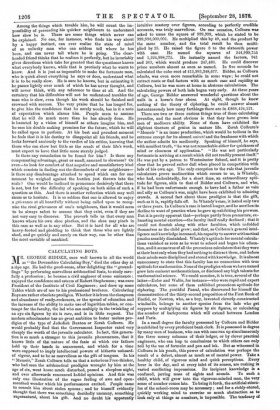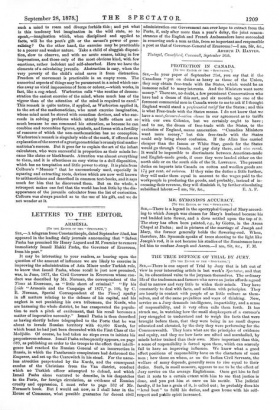CALCULATING BOYS.
MR. GEORGE BIDDER, once well known to all the world as "the Devonshire Calculating Boy," died the other day at a ripe age. He had the good-sense, after delighting the " ground- Bugs " by performing marvellous arithmetical feats, to study care- fully a profession ; he became a civil engineer of some eminence ; enjoyed the confidence and esteem of Robert Stephenson; was once President of the Institute of Civil Engineers ; and drew up some Tables which are of use to his professional brethren. Calculating Boys are rather obsolete prodigies. Whether it is from the cheapness and abundance of ready-reckoners, or the spread of education and the increase of the ability to make use of logarithm tables, or con- tempt for the faculty, the lad who can multiply in the twinkling of an eye six figures by six is rare, and is in little request. The modem schoolmaster has no great ambition to foster useless pro- digies of the type of Jedediah Buxton or Zerah Colburn. He would probably find that the Government Inspector rated very cheaply the worth of the juvenile calculator. In fact, this genera- tion is so much a stranger to this juvenile phenomenon, that it knows little of the nature of the feats at which our fathers held up their hands in amazement, and which for a time were supposed to imply intellectual powers of hitherto unheard- of 'vigour, and to be as marvellous as the gift of tongues. In his "Memoir," Zerah Colburn tells us that a notorious Free-thinker, who had seen the arithmetical prodigies wrought by him at the age of six, went home much disturbed, passed a sleepless night, and ever afterwards renounced Infidel opinions. And this was only one illustration of the vague feeling of awe and open- mouthed wonder which his performances excited. People came to consult him about stolen spoons ; and he himself evidently -thought that there was something decidedly uncanny, something supernatural, about his gift. And no doubt his apparently intuitive mastery over figures, according to perfectly credible accounts, was truly marvellous. On one occasion, Colburn was asked to name the square of 999,999, which he stated to be 999,998,000,001. He multiplied this by 49, and the product by the same number, and the total result he then multi- plied by 25. He raised the figure 8 to the sixteenth power with ease. He named the squares of 244,999,755 and 1,224,998,775. He instantly named the factors, 941 and 263, which would produce 247,483. He could discover prime numbers almost as soon as named. In five seconds he calculated the cube root of 413,993,348,677. Bidder, as Colburn admits, was even more remarkable in some ways ; he could not extract roots or find factors with so much ease and rapidity as Colburn, but he was more at home in abstruse calculations. The calculating powers of both lads began very early. At three years of age, George Bidder answered wonderful questions about the nails in a horse's four shoes. At eight, though he knew nothing of the theory of ciphering, he could answer almost instantaneously how many farthings there are in 1868,424,121.
There are two or three curious things true of these calculating juveniles, and the most obvious is that they have grown into men of mediocre ability. None of them have exhibited the slightest tincture of genius in mature life. Zerah Colburn's "Memoir " is an inane production, which would be tedious in the extreme except for its absurd naiveté and the frankness with which the author admits his mediocrity. Speaking of himself, he says, with manifest truth, "he was not remarkable either for quickness of mind or closeness of application." "He was not particularly fortunate in arriving at a result which did not readily present itself." He was put by a patron to Westminster School, and it is pretty clear that he proved rather dull when placed in competition with lads of his own age. The only exception to the rule that juvenile calculators prove mediocrities which occurs to us, is Whately, who had, undoubtedly, for a short time, an extraordinary apti- tude for figures, akin to that of Bidder and Colburn, and who, if he had been unfortunate enough to have had a father as vain and silly as Colburn's was, might have been exhibited to admiring crowds. A second fact about these prodigies is that the gift, such as it is, rapidly falls off. In Whately's case, it lasted only two or three years. In Colburn's case it lasted longer, and he ascribes its decline to want of practice when he gave up exhibiting his prowess. But it is pretty apparent that—perhaps partly from premature, ex- hausting mental exertion—the faculty itself really declined ; that it could not flourish along with other faculties, which unfolded themselves as the child grew; and that, as Colburn's general intel- ligence and knowledge increased, his capacity to answer arithmetical puzzles sensibly diminished. Whately's aptitude for mental calcula- tions vanished as soon as he went to school and began his educa- tion, and it seems true of all the precocious calculators that they were at their best only when they had nothing to distract them, and before their minds were disciplined and stored with knowledge. It is almost unnecessary to state that this faculty has no connection with true aptitude for mathematics. None of the pro digies whom we have named grew into eminent mathematicians, or disclosed any high talents for mathematical science. We could mention, it is true, several of the latter—Euler and Wallis, for instance—who were rapid and expert calculators, but none of them exhibited precocious aptitude for ciphering. The youthful Pascal, who discovered for himself the demonstration of the thirty-second proposition of the First Book of Euclid, or Newton, who, as a boy, invented cleverly-constructed windmills, belongs to another species from the lads who get coppers by multiplying six figures by six figures, or calculating the number of barleycorns which will extend between London and Paris.
In a small degree the faculty possessed by Colburn and Bidder is exhibited by every proficient bank clerk. It is possessed in degree by many men of business, who can with ease run up simultaneously the three money columns of their ledger, or by clever practical engineers, who can leap to conclusions to which others can only toil by the use of formulm and pen and ink. But as witnessed in Colburn in his youth, this power of calculation was perhaps the result of a defect, almost as much as of mental power. Take a
healthy child, of vigorous mind and quick perceptions. Every hour in the day, and at every inlet of its senses, are rushing in varied conflicting impressions. Its incipient knowledge is a confused, jarring mass of sights and sounds. To such a child, which will grow into the vigorous-minded man, the very
sense of number comes late. To bring it forth, the artificial stimu- lus of the school-room may be necessary ; and for a richly-stored, quickly working mind to exercise so much abstraction as to look only at things as numbers, is impossible. The tendency of
mach a mind to roam and diverge forbids this ; and yet what is this tendency but imagination in the wild state, so to speak,—imagination which, when disciplined and applied to facts, will be the poet's gift or the savant's power of gene- ralising? On the other hand, the exercise may be practicable to a poorer and weaker nature. Take a child of sluggish disposi- tion, slow to observe, and with no acute senses, taking in few impressions, and those only of the most obvious kind, with few emotions, rather indolent and self-absorbed. Here we have the elements of a calculating juvenile. Abstraction is easy, when the very poverty of the child's mind saves it from distraction. Freedom of movement is practicable in an empty room. The numerical aspects of things may be paramount in a mind which car- ries away no vivid impressions of form or colour,—which works, in fact, like a cog-wheeL Warburton calls "the routine of demon- stration the easiest exercise of the mind, where much less of the vigour than of the attention of the mind is required to excel." This remark is quite untrue, if applied, as Warburton applied it, to the art of the mathematician, who must exercise imagination, whose mind must be stored with countless devices, and who suc- ceeds in solving problems which utterly baffle others not so much because he can command his attention, as because he can combine and recombine figures, symbols, and forms with a fertility of resource of which the non-mathematician has no conception. Warburton's remark is singularly wide of the mark, if offered as an explanation of the secret of a great geometrician's or analytical mathe- matician's success. But it goes far to explain the art of the infant calculators, who were successful in proportion as their minds be- came like slates or blackboards. Attention was almost everything to them, and it is oftentimes an easy virtue to a dull disposition, which has no temptation and little power to stray. It is plain from Colburn's " Memoir " that he unconsciously used, especially in squaring and extracting roots, devices which are now well known to arithmeticians and described in common text-books, and it says much for him that he discovered them. But on the whole, a retrospect makes one feel that the world has lost little by the dis- appearance of the juvenile calculator from the list of curiosities. Colburn was always puzzled as to the use of his gift, and we do not wonder at it.































 Previous page
Previous page